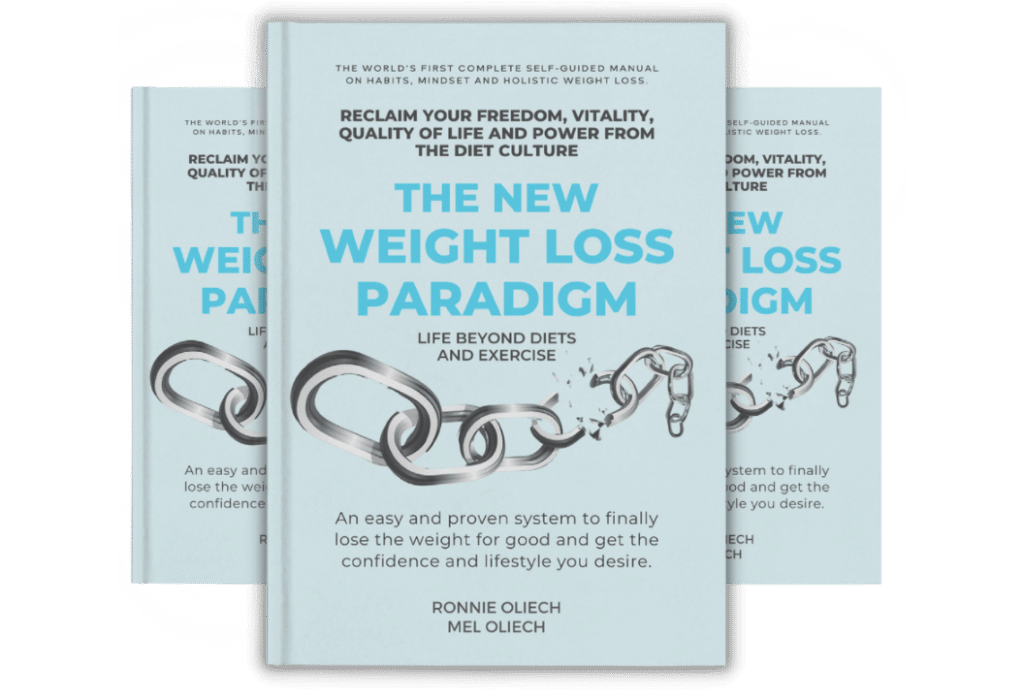Low self-worth and low self-esteem are often used interchangeably, particularly by people who don’t feel good about who they are.
But their meanings are actually different. Before we examine how low self-worth impacts your weight, we need to get clear on the difference between self-esteem and self-worth.
What is self-esteem
Self-esteem can be described as the way in which we evaluate ourselves — what we think, feel and believe about ourselves. If our assessment of ourselves is honest and realistic, then we have healthy self-esteem. However unhealthy self-esteem can fall into two categories:
- narcissism — when we exaggerate our positive traits and deceive ourselves about our faults
- low self-esteem — when we exaggerate our faults and underestimate or ignore all our positive characteristics.
People with low self-esteem view themselves through a harsh filter and often call themselves stupid, lazy, boring, selfish, hopeless, or think they’re bad people because of the things they say and do. They find it hard to accept compliments or believe people want to spend time with them.
What is self-worth
Self-worth on the other hand is the belief that you are valuable, worthy and loveable regardless of your traits or what’s happening to you. It’s the belief that you deserve love and positive things, despite your faults. Whereas self-esteem can vary depending upon what is happening in your life, self-worth remains stable. For example, your self-esteem may take a dip when you don’t perform well at something, but your self-worth will tell you that you still deserve to succeed. Self-worth is a belief based on your worthiness as a human being, rather than your personality traits, physical appearance, or list of achievements.
How does low self-worth affect you?
Low self-worth affects you in more ways than you realise, all of which will impact your weight. Low self-worth means you:
- don’t believe you’re worth investing in
- don’t think it’s worth the effort to lose weight
- don’t believe you deserve to lose weight
- won’t give your best efforts or be consistent with your efforts
- don’t believe others have your best interests at heart
- don’t believe other people can like you
- won’t do anything outside of your comfort zone
- won’t set goals
- discount products or services (if you’re a business owner)
- will compare yourself to other people
- will put other people’s needs first
- engage in people-pleasing behaviours
- will put up with toxic relationships and people treating you badly
- will work longer hours without extra pay
- won’t go for a promotion or pay rise
- will use alcohol to numb your pain
- will engage in binge or emotional eating to help fill the emptiness you feel
- believe you’ll be worthy when you’ve lost weight.
You might believe you’ll feel more worthy when you lose weight. But the truth is, you need to feel worthy first, before you can lose weight. Otherwise, you’ll continue to self-sabotage your efforts by engaging in all the behaviours listed above.
How does it affect your weight?
You won’t set specific goals
When we don’t believe we’re worthy of success, we won’t bother setting SMART goals — specific, measurable, achievable, realistic and time-bound. Instead, we have vague goals like “I want to lose weight”. However, unless we have specifics, we have nothing to push us to work towards the goal. We’ll never feel any urgency to get to work, and we won’t take the necessary action required, so we’ll be destined to be forever chasing the same goal, never achieving it.
You won’t make the effort
Not believing we’re worthy means we won’t make any effort to improve our health, or our weight, because we won’t believe that we’re worth it. Not believing we’re worth the investment of time, energy and money to lose weight means that we’ll continue to do what we’ve always done. And that has only led to weight gain.
Won’t give it your best
Even if we decide to do something about our weight, we’re not likely to put in our best efforts, or make a full commitment, because we won’t believe that we deserve to succeed. What happens, is that we’ll end up doing the things we want to do, or that we find easy, and only when we want to do them. We won’t invest the time to develop consistent good habits, or do the work to change the things that will make the biggest difference to our weight. We’re also more likely to self-sabotage ourselves, because deep down, we don’t believe we deserve to lose weight.
You won’t prioritise yourself and you’ll people-please
If we don’t believe that we’re worthy, we’ll continue to prioritise everyone else over ourselves, and engage in people-pleasing behaviour. This means that instead of putting our weight loss journey at the top of the list, we’ll do things for other people instead, even if we don’t want to. For example, we may stay out late drinking with others, when we really want to get a good nights’ sleep. Or we’ll say ‘no’ to food prep time, because a friend wants us to go shopping with them. Further details on how people-pleasing affects your weight can be found in our blog Are you ‘too nice’? Why people-pleasing is making you overweight.
You’ll be too busy working to focus on your weight loss
People with low self-worth often work more than other people do. Business owners with low self-worth, usually discount their goods and services because they don’t believe they’re worthy. This means they’ll have to work longer hours to make as much money as someone who doesn’t discount their products.
Those who are employed, are more likely to stay back late and work extra time, because they won’t be able to stand up to their boss and say ‘no’. They’re also less likely to go for a promotion or ask for a raise, because they don’t believe they’re worth it.
People who are tied to a job and working long hours never have time to do the things they need to do to lose weight. Things like weekly food prep, cooking a healthy meal for dinner, getting to bed on time, and having time to do workouts are much more difficult. These things eventually fall by the wayside because these people are ‘too busy’ and ‘too tired’ from work.
You won’t focus on your journey
When we have low self-worth, we’ll probably spend a lot of time comparing ourselves to other people and coming out second-best. Research shows that the lower our self-worth, the more likely we are to compare ourselves with someone else in an unfavourable light. This can erode our self-worth even more and cause us to further doubt our ability to lose weight, or make sustainable change. In addition, all that time spent comparing is time not spent on our own journey, which means that we won’t be able to lose weight and keep it off. Comparing yourself with others can impact your journey enormously, so to understand this fully, be sure to read our blog How comparing yourself to others slows down your weight loss.
You’ll have toxic relationships
Not feeling worthy leads to toxic relationships. This is because we put up with people using us, making fun of us, abusing us (physically and emotionally), taking advantage of us, or taking us for granted. We’ll also continue to do things to please these people, because we’ll care more about what they think of us, than our own wellbeing. These types of friends won’t be supportive or help us lose weight. They won’t have our best interests at heart, encourage us when we need it, or tell us the hard truths when we need to hear them. To lose weight and keep it off, we need a support network of people we can rely upon. But we’ll never find them when we allow toxic people in your life.
You won’t be accountable
Finally, low self-worth means we won’t make ourselves accountable to anyone for our weight loss, nor will we work with a coach. Accountability is scary and requires you to be vulnerable, but it’s the only thing that will get results. Unfortunately, low self-worth will stop us from being honest and open with a coach who can help us get results, because we’re so afraid that they’ll think we’re worthless too. So instead, we spend energy trying to hide our true self and pretend we don’t need anyone. But ask yourself, where has doing it alone got you?
How to improve your self-worth
Unfortunately, many people tie their self-worth to 5 key things:
- what they look like
- how much they earn or own
- who they know, or how many they know
- what they do (career)
- what they achieve.
But self-worth is not about any of these things. People with high self-worth don’t find their value in their income, appearance or job. Their value is about who they are as a person, knowing that they are worthwhile regardless of these things.
Self-worth is about accepting yourself for who you are, and where you’re at — even if you’re overweight — and understanding you’re just as worthy as anyone else. Just because you don’t have the body you want, doesn’t mean you’re less worthy than someone else who is happy with theirs. Similarly, just because you earn more than someone else, doesn’t mean you’re more worthy than someone living on the poverty line.
The key to increasing your self-worth and losing weight is to work with a coach that you can trust, and who knows how to help you.
Through our Diet Antidote Transformation System (DATSTM Program) The Not-Diet-diet for people who are sick of diets and want more than a good body, we have helped countless people improve their feelings of worthiness and now we’re ready to help you. We’re able to recognise the habits that are keeping you in this cycle, and then devise a personalised, structured plan of action, with the right amount of accountability, that will help you overcome these habits.
Once you start to change your habits and mindset, you’ll find that your self-worth will increase, your confidence will improve, you’ll start doing more things for yourself, and you’ll be more successful in losing weight.


















